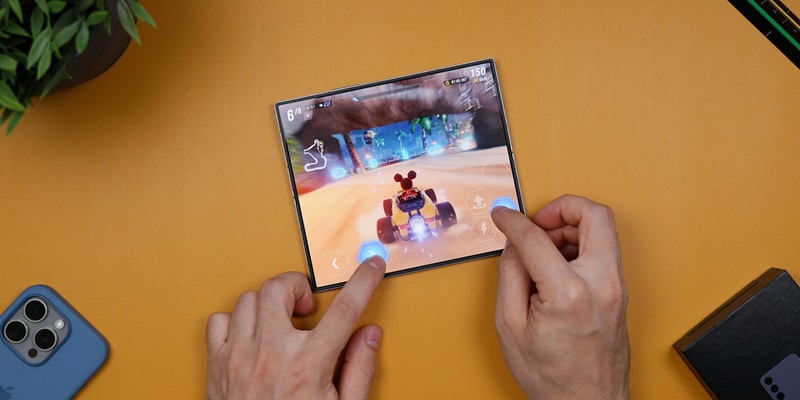Apple’s much-anticipated entry into the foldable device market has been pushed back to no earlier than the second quarter of 2026 due to concerns over the durability of the foldable displays. Initial speculation suggested that a foldable iPad could reach mass production as early as 2025, but newfound insights, including those from analyst Jeff Pu, indicate a significant extension to this timeline. The combination of high-quality standard requirements and cautious technological refinement sets Apple apart from its competitors, even as the world waits eagerly for its foray into foldable technology.
Apple’s Stringent Quality Standards
One of the most prominent reasons for the delayed release of Apple’s first foldable device is the company’s stringent quality standards, particularly regarding the durability of foldable displays. Apple’s cautious approach starkly contrasts with competitors such as Samsung, which has already introduced six generations of its Galaxy Fold tablets. Apple aims to refine the foldable technology meticulously before its market debut, prioritizing the elimination of the crease that commonly appears along the fold. This commitment underscores Apple’s longstanding dedication to product quality and user experience, setting an industry benchmark.
During internal testing phases, various prototypes and developmental models are rigorously assessed, with durability being a top priority. Unlike Samsung, which has rapidly iterated its foldable product line, Apple seems prepared to delay market entry until the technology meets its high standards. Supplier talks in Asia have confirmed that the company is exploring multiple approaches to maximize the longevity and performance of its foldable displays. This strategic delay not only highlights Apple’s quality-focused perspective but also emphasizes its core principle of offering refined and reliable technology, even if it means taking a conservative stance and trailing behind competitors.
Top-Down Foldable iPhone
Apple is reportedly experimenting with several different form factors within its forthcoming foldable line, attempting to innovate while adhering to its stringent quality measures. One notable possibility is a top-down foldable iPhone, which closely resembles Samsung’s Z Flip series. This form factor is particularly interesting as it aligns with existing consumer preferences for compact, easy-to-carry smartphones. Early designs and internal tests suggest that Apple is considering every detail meticulously, from hinge durability to display continuation, ensuring that the foldable iPhone meets the brand’s exacting standards.
The development process involves numerous iterations and extensive testing phases to guarantee a product that not only matches but surpasses consumer expectations. Given the success of Samsung’s Z Flip and the positive market reception, Apple’s entry into this segment is eagerly anticipated. However, with a release no earlier than 2026, it remains to be seen how the market dynamics will shift and whether Apple’s delayed but highly refined product will steal the spotlight. The meticulous pace signifies Apple’s steadfast commitment to bringing a well-polished product to the market rather than rushing for early entry.
Foldable MacBook Possibilities
Further expanding its exploratory ventures, Apple is also working on a 20-inch foldable MacBook, which might not become available until 2027. This concept represents a significant leap in foldable technology, indicating Apple’s belief in the versatility and potential of such devices. While tablets and smartphones are the usual suspects, a foldable MacBook merges portability with the capabilities of a full-sized laptop, creating a new niche in the market. Analyst Ming-Chi Kuo has provided insights into this ambitious project, stating that Apple’s careful approach remains consistent across different devices.
Development rumors and patents hint that Apple is focusing on perfecting the hinge mechanisms and ensuring a seamless user experience for potential foldable MacBook users. This exploration reflects Apple’s innovation drive while maintaining its reputation for durable products. The methodical development of these devices illustrates Apple’s long-standing philosophy of prioritizing quality and user satisfaction over being the first to introduce new technology to market. The delayed rollout of this ambitious project could potentially redefine user interaction with laptops, setting a new benchmark for competitors.
Apple’s Conservative Stance on Foldable Technology
Apple’s methodical pace in entering the foldable market is driven by a conservative stance prioritizing product quality and performance. The overarching theme is Apple’s unwavering commitment to releasing durable and high-quality devices, a stance that stands out in an industry where rapid innovation often comes at the expense of product reliability. Through its supplier discussions and developmental milestones, Apple showcases explorative efforts to create a foldable device that is not just innovative but also meets their rigorous standards.
While competitors like Samsung have swiftly advanced and gained market share, Apple remains undeterred by the industry’s fast-paced trends. Instead, it focuses on delivering a foldable device that encapsulates the brand’s essence of excellence and longevity. The prolonged development timeline, although causing delays, is indicative of Apple’s strategy to perfect the technology for reliability and an unwavering user experience. This deliberate approach ensures that when Apple finally enters the foldable market, it does so with a product that sets a new standard for the technology.
Aligning with Core Values
Apple’s eagerly awaited introduction to the foldable device market has been delayed to 2026 at the earliest, primarily because of worries about the durability of foldable displays. Earlier predictions had suggested that a foldable iPad might be ready for mass production by 2025. However, recent insights, particularly from analyst Jeff Pu, have revealed that this timeline has been significantly extended. A mix of stringent quality standards and a cautious approach to technological refinement distinguishes Apple from its competitors. While other companies rush to launch their foldable devices, Apple is taking extra time to ensure that its product meets the high standards its customers expect. This deliberate pace underscores Apple’s commitment to delivering a foldable device that not only innovates but also reliably meets the rigorous demands of daily use. As the global market eagerly anticipates Apple’s entry into foldable technology, this delay highlights the company’s strategy of prioritizing quality and durability over speed to market, ensuring that the final product will be worth the wait.

